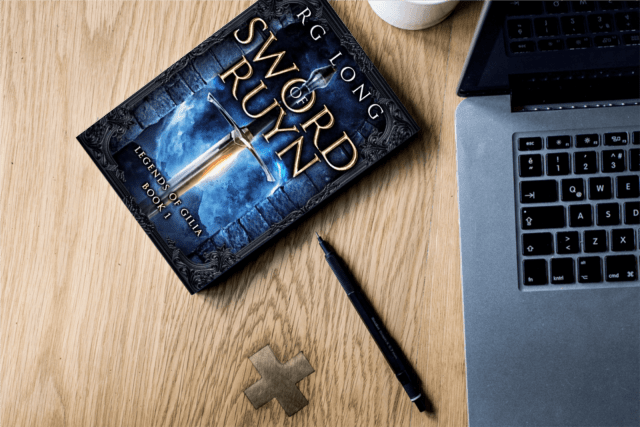
There is something impossible to describe about the older epic fantasy novels, like Tolkien’s Lord of the Rings, or The Sword of Shannara, or other books of the same era. Modern fantasy books can be equally epic in scale, but they read differently; not badly, just differently, much as older science fiction reads differently from modern science fiction. Ronald G. Long’s Sword of Ruyn reads like one of the older epic fantasy novels. And it is most definitely an epic fantasy.
The story begins with Ealrin, our main character, washing up on a beach with amnesia. He is in unfamiliar territory, and awakens to find himself being tended in a small coastal town by Holve, and adventurer who has a few tasks ahead of him and who is impressed by Ealrin. Ealrin goes with Holve and Roland, a fellow adventurer, to see about fighting against goblins and mercenaries who believe that the elves and dwarves who also rule the land should bow unequivocally to humankind. Much like any epic, the scope of this story starts small, focusing on Ealrin and the questions about his past, which is mysterious and possibly not as pleasant as he would like. The story then shifts and grows to become about so much more, as Ealrin and his companions experience new dangers and learn of the threats their lands are facing. An epic fantasy, adventurous, grand, and interesting beyond all doubt.
The story itself is very well written. The prose is fluid and moves seamlessly from one scene to the next. The dialogue is distinct for each character and still manages to portray their particular race and culture. The characters themselves are well developed and unique. I find myself really enjoying Ealrin and Holve, but Roland, their temporary companion, is by far my favorite. The characters, no matter the race, are realistic and interesting, displaying cultural attributes that make them distinct and yet part of their greater whole. Some of the characters could have perhaps been expounded upon a little bit more, but that is not really necessary. Most of them died anyways, as is often the case with epic fantasy, so I would have probably have grown more attached to the characters had they been developed deeper and then probably would have been more affected by their deaths.
As far as the plot goes, this book definitely has some of the favorite aspects of the fantasy novel. There is intrigue—in the form of Ealrin having no memory and the possibility of a questionable past—as well as adventure. Actually, the adventure is where a good portion of the supporting cast meets their terrible fate. It is hugely necessary, considering the stakes coming from two enemy attacking from flanking sides, but a little bit sad. The adventure is great, though, and moves the story along nicely. Not to mention it helps Ealrin develop from a basically blank slate to something far more useful and dangerous and important. The worldbuilding itself adds to the adventure, because there is more at stake than just humanity, there is the fate of an entire world of distinct and fascinating people and cultures and races.
My main critique for this story is that there are a few pieces that come up in the worldbuilding that are not particularly necessary to the story. For example, many of the aspects of the dwarven language, such as the purpose of their cities being denoted by certain terms, is not really necessary to the story and appears more like exposition than Ealrin actually experiencing a new world. There are a few places where such exposition occurs, and this could have been fixed by having Ealrin experience these things or think about these things, rather than the narrator/author telling us. It is important to build the world, in order to have the reader able to imagine a complete and detailed picture. This book definitely gives us that. The details, though, appear more as extraneous than otherwise simply because Ealrin is not necessarily learning about the world in the same manner as the readers. However, these aspects do not really detract from the story and they are quite interesting when looked at from the aspect of a bigger picture.
Overall, I would say that Sword of Ruyn is a good, interesting, entertaining book that explores the realm of epic fantasy in a way that is both modern and classic. It is the perfect book with which to curl up next to a fire with a hot beverage. And the ending— n fact all of the events leading up to the ending—is quite dramatic and brings up more extremely pressing questions that will have to be answered in book two. This book is one that I would recommend, for all those who love fantasy from its roots to its modern variations. I know I do.
Amazon: https://www.amazon.com/Sword-Ruyn-Legends-Gilia-Book-ebook/dp/B079QVQ3RR
